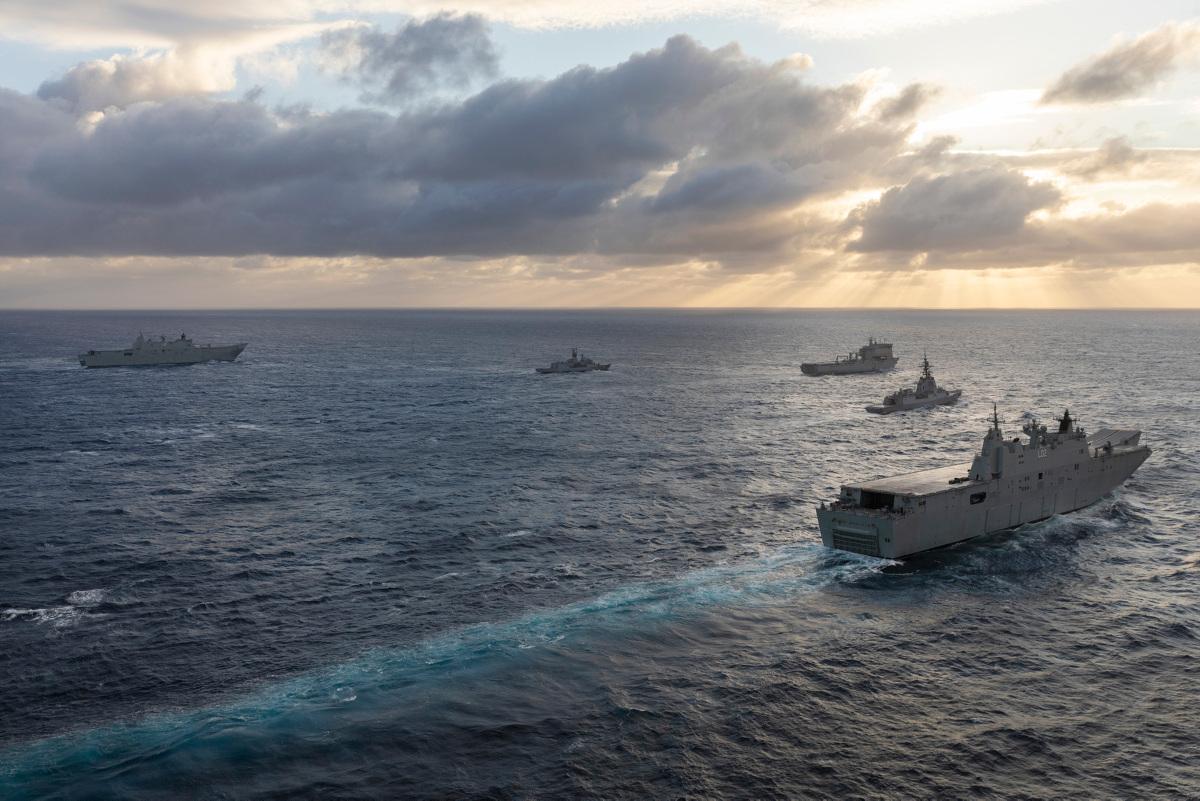
Sea state
The Royal Australian Navy has sent three warships from Fleet Base East, and four from Fleet Base West, to undertake exercises off northern and eastern Australia. HMA Ships Anzac, Arunta, Ballarat and Sirius departed from Perth and Canberra, Hobart and Stuart from Sydney. Anzac will conduct sea trials after recently undergoing a mid-life upgrade. Ballarat is heading east, while the others will test their systems and conduct warfare training as part of a maritime task group exercise.
The US Navy is investigating why the new aircraft launch system failed on the US$13 billion aircraft carrier USS Gerald R. Ford. The electromagnetic aircraft launch system (EMALS) has faced technical difficulties since testing began in 2015. EMALS uses electricity and magnetism and replaces the old steam-powered catapult system to launch aircraft. There were no flight-safety issues caused by the malfunction, and the carrier has continued trials.
Flight path
Russian Su-30 Flanker, Su-35 Flanker-E and MiG-31 Foxhound jets recently intercepted two US B-52H bombers conducting a training mission over the Sea of Okhotsk in the western Pacific Ocean. Russia’s defence ministry says it has registered intensified military activity by the US and its NATO allies and escorted the two bombers at ‘a considerable distance from the Russian state border’. American bombers have in the past been used to signal the US Air Force’s ability to operate from new bases across the Pacific. A Russian video of the interception can be found here.
The Royal Air Force and Qatar Emiri Air Force have started flying operations in the first multinational squadron in British service since World War II. No. 12 Squadron will see RAF personnel training their Qatari counterparts to fly and maintain the Eurofighter Typhoon as part of a $9.2 billion order for 24 Typhoons and nine Hawk T2 jets. Qatari Defence Minister Khalid bin Mohammad al Attiyah said the squadron ‘represents the alignment of vision and strategy in building for a stable and prosperous future for both nations and the world’.
Rapid fire
The French Army has published a strategic plan to strengthen the force by 2030 in view of the heightened threat of state-on-state conflict and new, ‘more insidious’ tactics. Particular attention will be given to the troops stationed in French territories in the Asia–Pacific, to protect sovereignty and protect against Chinese expansionism. The report stressed the importance of improving the army’s ‘capabilities in the electromagnetic environment, space, cyberspace and information technology’ and utilising industrial partnerships with other European countries.
9News has revealed body-camera footage recording the moments before the death of Australian soldier Jason Challis, who was fatally shot during a training exercise in the Northern Territory in 2017. An inquest found that the private’s death was caused by failures during the exercise and could have been prevented, but the army has refused to release information about the internal actions it took against those involved in the incident.
Final frontier
The US has released a strategy to maintain US space superiority in a ‘complex security environment’ characterised by competition with China and Russia. The 2011 National security space strategy said space was becoming increasingly ‘congested, contested, and competitive’, but the latest strategy highlights its militarisation. The Defense space strategy sets out four ‘lines of effort’ to adapt America’s defence space enterprise to the new strategic environment.
NASA is set to launch a helicopter dubbed Ingenuity along with a rover called Perseverance to explore Mars. The helicopter will test flight capabilities in Mars’s atmosphere, while the rover will search for ancient signs of life on the red planet. The spacecraft carrying the two vehicles is scheduled to lift off on an Atlas V rocket from Florida on 20 July and land on Mars in February 2021. If the launch is unsuccessful, NASA will have to wait another two years for the next opportunity.
Wired watchtower
Prime Minister Scott Morrison announced on Friday that Australia has been hit by major cyberattacks targeting ‘all levels of government, industry, political organisations, education, health, essential service providers and operators of other critical infrastructure’. The scale and sophistication of the efforts point to a state-based actor; however, the prime minister did not name the country responsible. Government sources and experts have pointed to China as the most likely culprit and view the announcement as a warning to the perpetrator. China has denied it is behind the attacks.
Amid the deadly China–India border dispute, India has reportedly been hit by sustained distributed denial-of-service attacks from China targeting Indian government websites and banks. The attacks are thought to have originated in Chengdu, the location of the People’s Liberation Army’s unit 61398. In a sign that India is increasingly wary of China, the country’s government will ban Chinese companies from providing equipment to state-run telecommunications operators.